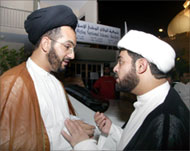Bahrain passes law on political groups
King Hamad of Bahrain has ratified a controversial law for political associations, despite repeated calls by the opposition not to pass it for fears that their operations will be restricted.

The new law stipulates that political associations can be formed as long as they are not “based on class or profession, sectarian, or geographical,” the BNA official news agency reported.
Political groups operate in Bahrain as associations due to a continued ban on political parties despite recent attempts to introduce reforms to the country.
Six groups said late on Saturday they were considering their options over how to protest against the king’s decision. One option is to close.
“It is impossible to see that all political spectrums in the country were against the law and it still came out this way,” said Jasim al-Mehzea, the head of the Al-Wassat association.
Restrictions
Political associations had protested against the law when it was passed by the kingdom’s parliament early in July, claiming it would restrict their funding by banning donations from foreign countries.
 |
|
Leaders protested agains the law |
“The new law banned … foreign funding of training, while MPs themselves receive foreign funding for such purposes,” president of the National Democratic Act Association, Ibrahim Sharif, said at the time. Foreign funding is used to cover the costs of attending forums abroad, for example.
The opposition groups also said the law restricted them by raising the minimum age to join such groups from 18 to 21.
“Adopting the law as it is means there is no real freedom for political work,” Shaikh Ali Salman, head of the Shia Muslim conservative Islamic National Accord Association, said earlier this month.
Bahrain allowed political groupings in 2001 to establish political associations. Several of these associations operate in the small Gulf kingdom representing Sunni and Shia Islamists, as well as liberals, leftists and Arab nationalists.